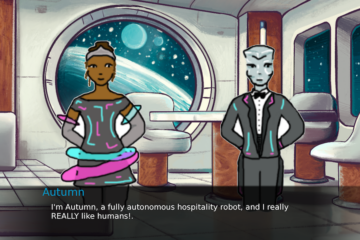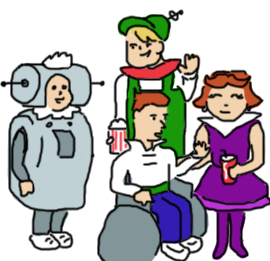My first novel, Galactic Hellcats, features a matriarchy.
My third novel, The Gods Awoke, takes place entirely within a matriarchy.
I’m revising a novel right now that has, well, a matriarchy.
Why do I keep returning to this theme?
When I was in sixth grade, I had to come up with an end-of-six-weeks project for Social Studies, and my older sister said, “Oh! Do a comic about, like, sexual harassment, but reverse the genders!”
(Adult me has feelings about both ‘reversing’ and ‘the genders’, but let’s slide past it for now.)
I loved the suggestion. I rushed out and did a massive poster-sized comic where a young man is sexually harassed by his female boss. It does not survive, and I think my teacher was, frankly, confused.
“What are you trying to say with this?” he asked.
“It’s sexual harassment,” I responded.
He frowned, shook his head, and said, “I’ll give you a C, I guess.”
(I guarantee my work was not the brilliant commentary I thought it was. Memo to me: write a blog post on “bringing up issues without saying anything about them.”)
Anyway, I was Hooked on Matriarchy from an early age. My favorite books were full of Matriarchies – from the women-have-magic Witch World by Andre Norton to the Space Warrior Nomad Women in C. J. Cherryh’s Faded Sun.
Yet there was something unsatisfying in all of these. Why did the magic women on Witch World have to stay virgins or lose their magic? Why were the non-warrior women among the Mri treated as a separate caregiving caste?
My goal in my sixth grade project had been to show my audience (one middle aged white male teacher?) what sexual harassment was like by making the target of that harassment like him. I knew I hadn’t really succeeded, but there had to be some work out there that did it, that took an experience I had of my gender and re-created it for another.
I have a strong memory of this TV Show “Otherworld”? Something like that – a Typical American Suburban Family was sucked into a fantasy world where they had to pass from portal to portal, world to world. Almost inevitably, one portal lead them to Matriarchy World. There was a scene of the dad grocery shopping, not uncomfortable with the job though apparently never having done it before, but amused that the signage was all simplified for “uneducated men.” The episode climaxed in a slave market where the teen son was almost sold off for the crime of taking his shirt off while grilling.
It stood out only as the most gag-worthy example of over-the-top matriarchies in science fiction television. The “Foolish male slave! Do my laundry!” Style of matriarchy popular in erotica and, well, a lot of places.
Twice I’ve had male editors push back on elements of my matriarchies, asking me to make things worse, less equal. More fetishized. I can’t help but think that means “less commenting on the existing social inequities based on gender in our society.” I can almost feel male viewers relax as an over-the-top matriarchy unfolds, “Ah, see, this has nothing to do with our world today! Women have the right to vote! Look how much fairer we are! Also let me daydream a little about a dominatrix.”
Thinking back to the Andre Norton and C. J. Cherryh examples, both women authors, I think their takes on matriarchy reflect their gender experience. Norton grew up in the 20s, a world where if she got married she’d have been expected to give up her career and independence. No wonder her magic women must remain virginal! And Cherryh imagined a lovely alien society, but separated out elite power-having women from those with a traditional role, much like her own world writing in the 1970s.
I wanted a matriarchy that addressed my relationship with gender, power, and stereotypes. The my-mother-was-a-second-wave-feminist and my-father-was-a-primary-care-giver view. So I suppose it makes sense that I care about care-giving. The labor activist in me rankles at the exploitation of child care workers in our culture, and the unfair burden of unpaid, unacknowledged labor in the home. The child of a single father in me knows that there’s nothing ‘more nurturing’ about one gender over another.
I’ve seen too many examples not to believe that what we consider “men’s work” and “women’s work” is arbitrary, cultural, not an immutable fact of nature.
Many men and women wish they could cut back their work hours for the more rewarding work of child-rearing. Why then would we consider it a low-status job? Assigning low status to child-rearing is a choice our culture made, not an immutable law of the universe. What if your aliens are not mammals? There’s no reason for a mammary-equipped adult to hang around the kids, then. What if your society reveres the work that creates useful members of society as much as it is really, honestly, vital to our continued existence? What would that society look like?
Speculative fiction is a place we can unpack and question assumptions like these. The more something feels “natural” and “unchangeable” the more it behooves us to do the work of imagining different.
I was shocked when a man reading my novel The Gods Awoke asked me if the women weren’t bigger then the men because they were “in charge.” I had definitely not assumed that, the women and men are human proportions, with the men slightly larger. Maybe strength doesn’t equal status. Maybe being the stronger sex means your time is best spent lifting heavy objects, dear pack animal. (This sentiment brought to you by my being the family pack animal.) I tried to blend this with men being shown in a variety of jobs, but dominating construction, porters, and other strength-requiring fields, including housework. (Don’t tell me pre-modern housework didn’t take a strong back!)
The Matriarchy in The Gods Awoke is intended to be close to 1990s-level sexual politics. A few token men have power, therefore “the genders are equal now!” even though those token men are assumed to have “slept their way to the top.” Men feel squeezed into male-dominated job fields, and of course have to come home and do all the housework, but that’s the price you pay, and they are sure they are better at, anyway. (I have a male character try to take over food prep for a woman who is mildly amused and asks him if he thinks she can’t do it.)
(Shameless plug: Buy The Gods Awoke wherever books are sold!)
There would be things I’d have done differently if I hadn’t started the book in the year 2000. My view of gender roles has changed and evolved as the world around me has. How BINARY all of this blog post has been! I live right now in a society where people are actively deconstructing that binary.
The great thing is I am constantly seeing new assumptions to tackle, so I don’t think I’ll run out of matriarchies any time soon.


